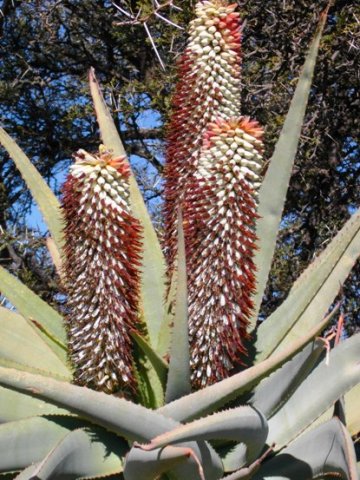Aloe speciosa inflorescence

Author: Ivan Lätti
Photographer: Thabo Maphisa
The flowers of Aloe speciosa shown here have nearly lost all the red colour on the perianth buds. This is because they were nearly all hastening to open at the time the photo was taken in mid-August. This plant grows in the Karoo Desert National Botanical Garden.
Flowering in habitat normally occurs from July to September, the middle of the blooming season. Worcester is not too far west of Swellendam, the western extreme of the plant’s natural distribution range, to alter the flowering conditions much.
Several Aloe species have flowers that undergo colour changes when the buds open, often from red to yellow. In the case of A. speciosa the red is replaced by green with white stripes on fully opened perianths. The many red-brown or black, exserted anthers on these racemes add their own unusual dimension to the floral appearance. This feature is shared with many other Aloe species, although in some cases the effect of long stamens is not as striking.
Three single racemes are on display here. A. speciosa racemes do not branch but there may be up to four singles on one rosette. The racemes are short (only about 50 cm) compared to e.g. A. ferox that bears long ones.
The cylindrical inflorescence shape seen here is sometimes more conical, when the upper buds are still below full length. The stalk or peduncle of the raceme is about 20 cm long and usually hidden among the leaves. There are many brown, sterile bracts spaced upon the surface of the peduncle (Frandsen, 2017; Van Wyk and Smith, 2003; Reynolds, 1974; iNaturalist).

